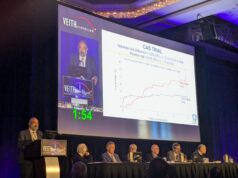
Research from Ochsner Health published in the Journal of the American College of Cardiology (JACC) is likely to influence expanded insurance coverage for carotid artery stenting.
The paper, “Carotid artery stenting: JACC state-of-the art review”, details significant advances in the field of carotid stenting. It concludes that the technique “has achieved parity with carotid surgery for stroke prevention,” and that the data “support updating the national coverage decision for carotid stenting from the Centers for Medicare and Medicaid Services [CMS] to equal coverage for carotid surgery”.
“Carotid artery stenting is a minimally invasive procedure compared to open surgery,” explains first author Christopher White, MD, system chairman for cardiovascular disease director and director of John Ochsner Heart & Vascular Institute in New Orleans, Louisiana. “Overall, stenting and surgery are equivalent in patients who are good candidates for both, and the patient and their doctor should discuss which one is better for the individual patient.”
The paper analyzes several large, multicenter randomized controlled trials encompassing data from over 25 years and more than 10,000 patients to demonstrate that carotid artery stenting can be just as effective as surgery when it comes to long-term stroke prevention and durability.
The paper suggests that the current CMS coverage decision regarding carotid stenting is outdated and places Medicare patients at a disadvantage by restricting their options for less invasive treatment, and recommends expanding coverage to be equivalent to open surgery.
“The current literature supports equivalent results for carotid stenting and carotid surgery in patients who are suitable candidates for both procedures,” says White. “Some patients will not be good candidates for stenting and should receive surgery, while some patients will be poor candidates for surgery and should receive stents.”
Current coverage is likely to be expanded in the near future to include coverage for carotid stenting that is equal to carotid surgery for those who are symptomatic with a carotid stenosis ≥50% and ≤99%, and those who are asymptomatic patients with carotid stenosis ≥70% and ≤99%.
“We believe our multidisciplinary paper, written by neurologists, neurosurgeons, vascular surgeons, and cardiologists, will be an important summary of the most recent evidence that will support CMS in reimbursing both procedures on an equal basis,” says White.











